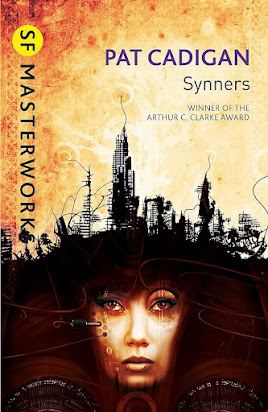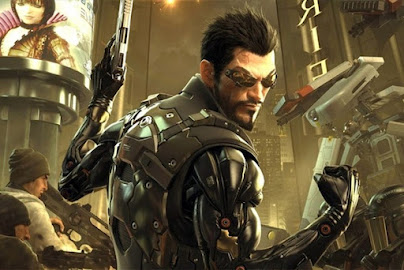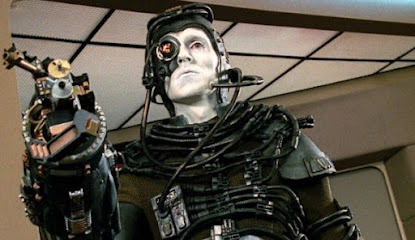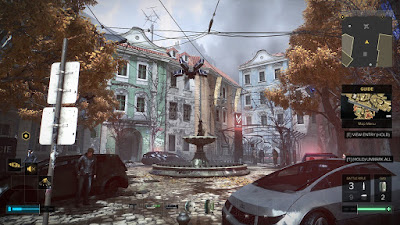As with any new movement, it’s barely even started before people start saying it’s over. In the case of cyberpunk, the genre was facing declarations of its mortality before the ink was cool on William Gibson’s Sprawl trilogy. But through the late 1980s and early 1990s, key works in the genre continued to appear from new talent.
The Queen of Cyberpunk
Cyberpunk had been, at least so far, a male-dominated subgenre. In 1987 Pat Cadigan became the first woman to publish a major work of the genre,
Mindplayers. In this novel a young woman faces mental delusions after using a stolen cyber-interface and has to be “cured” by a type of mental hacker, a mindplayer. Cadigan’s novel delved into the interrelationship between technology and identity in a way that recalled Philip K. Dick. She expanded on many of these themes in sequel novellas and the related novel
Fools (1992).
Her second novel,
Synners (1991), is a more epic exploration of cyberpunk ideas. It is set closer to the present day than most cyberpunk works, in a more recognisable version of Los Angeles, as individuals from both sides of the law get swept up in an impending technological crisis.
Cadigan moved on to explore other types of fiction (ironically just after
The Guardian proclaimed her the “Queen of Cyberpunk” in 1994), but in later years returned to the genre thanks to her work on the
Alita: Battle Angel franchise, penning a novelisation and an original novel in the setting of the 2019 movie.
Other women writing in the genre soon gained prominence, most notably Lisa Mason for her debut novel
Arachne (1990) and Melissa Scott for her 1994 novel,
Trouble and Her Friends (1994).
Playing in a Cyberpunk World
Given the technological nature of cyberpunk narratives, it wasn’t long at all before cyberpunk stories started appear in the form of video games. One of the first was
The Screamer (1985), a CRPG featuring, unusually for the time, real-time combat. The
Megami Tensei and
Metal Gear series both began in 1987, having cyberpunk themes even if the settings were not outright cyberpunk.
It wasn’t until the 1990s the technology existed to really do cyberpunk games justice.
Captive (1990) was a cyberpunk take on Dungeon Master, a first-person, real-time “dungeon” crawl, with the dungeons now being technologically-advanced bases and the enemies being robots. The game was enjoyable, but a fairly obvious SF remix of an earlier game. Its sequel,
Liberation (1993), was vastly more ambitious. Liberation created a huge cyberpunk city in (primitive) 3D where every building could be searched and explored, and the player had to follow a chain of clues to find an imprisoned captive. In a similar vein was the
Mercenary trilogy –
Mercenary (1985),
Damocles (1990) and
The Dion Crisis (1992) – the latter two of which featured an entire star system (complete with relativistic effects as you travelled between different worlds), though its cyberpunk credentials were less impressive.
Particularly notable was
Flashback (1992), a platform game with an incredibly-animated main character, heavily inspired by
Prince of Persia (1989) and
Another World (1990).
Flashback was a significantly longer game with a much more involved cyberpunk story, featuring the main character having his memory erased by invading aliens and having to fight to retrieve it whilst defeating the invaders. The game was hugely successful, spawning a direct sequel,
Fade to Black (1995) and a remake (2013).
Also in 1993, Bullfrog Productions released one of the greatest cyberpunk games of all time.
Syndicate saw the player taking control of a super-corporation complete with its own paramilitary force, which the player can upgrade and develop by taking over rival territory. The game casts the player as a morally dubious corporate business leader who can pursue his or her agenda through outright violence, more surgical assassination techniques or using a “persuadatron” to override people’s implants and turning them into unwitting slaves. Syndicate was a huge success and was succeeded by
Syndicate: American Revolt (1993) and
Syndicate Wars (1996), as well as an uninspired first-person remake,
Syndicate (2012) and a superb “spiritual successor,”
Satellite Reign (2015), which expanded impressively on the original game’s themes in a massive, open-world cyberpunk city.
Almost as influential was
Beneath a Steel Sky (1993), a huge adventure game featuring an epic narrative set in a futuristic city. The game’s visual design was created by Watchmen artist Dave Gibbons and the game was a big hit. The developers were side-tracked by the
Broken Sword series, which was a massive hit, but released a long-awaited sequel,
Beyond a Steel Sky, in 2020. In 1997 a similar adventure game was released based on the film
Blade Runner, and was a cult success.
That same year Squaresoft released
Final Fantasy VII, the first game in their long-running fantasy series to incorporate cyberpunk ideas such as class struggle, industrial squalor and biological-machine interfaces. The game was a colossal success, resulting in a remake in 2020 and additional games in the series exploring similar ideas.
In 2000, Ion Storm released what many consider the ultimate cyberpunk video game:
Deus Ex. Set in the near future, the game focuses on augmented humans caught up in a complex global conspiracy. The game allowed for massive, unprecedented and rarely-matched-since amounts of player freedom and influence on the outcome of the plot. Widely regarded as one of the single finest and most important video games ever made, it has enjoyed a sequel,
Invisible War (2003) and three prequels,
Human Revolution (2011),
The Fall (2013) and
Mankind Divided (2016).
Human Revolution and
Mankind Divided delved more deeply into cyberpunk themes of transhumanism, identity and corporate corruption.
Cyberpunk became more of a background setting for video games such as
Mirror’s Edge (2008),
Hard Reset (2011) and
Far Cry: Blood Dragon (2013). More in-depth exploration of cyberpunk themes came in games like
Transistor (2014) and the
Watch_Dogs series (2014-present), which depicts the transitional period as a more modern world gives way to a cyberpunk future.
The largest and most popular cyberpunk video game of all time – and the most contentious – launched in 2020.
Cyberpunk 2077, based on Mike Pondsmith’s
Cyberpunk tabletop RPG, features jaw-dropping graphics and impressive freedom to explore a futuristic city, coupled with a compelling, rich storyline and memorable characters. However, the game launched with a plethora of technical issues and missing features, which gave the game a mixed reception. Launched a few months earlier, the much smaller, tighter and more focused
Cloudpunk sees the player as a sky taxi driver undertaking some very odd jobs over the course of one strange night, set in a beautifully-realised city.
Cyberpunk continues to be a rich genre and source of ideas for future video games to mine.
Satirising the Genre
Heading into the 1990s, cyberpunk was well-established enough for writers to start poking fun at it. Of course, satirical takes on the genre had existed before, with
Judge Dredd starting barely after the genre really even got off the ground. But as the genre had evolved, a slight tendency for it to become po-faced and self-serious had developed.
In 1992, Neal Stephenson poked fun at the genre in his seminal work
Snow Crash. Main character Hiro Protagonist (a deliberate pun) is a pizza delivery driver and hacker who discovers a computer virus that can affect the human mind in the real world, leading to a dizzying journey of discovery taking in Sumerian history and mythology, political struggle and cryptography (expanded on his non-cyberpunk epic,
Cryptonomicon, and its prequel/sequel trilogy,
The Baroque Cycle). The novel is part of cyberpunk but also challenges and subverts the genre.
Similarly metafictional is
Headcrash (1995), by the genre-namer himself, Bruce Bethke. The novel features a protagonist who sets himself up in an online VR community as a cool, trend-setting guy only to realise he is one of millions of people trying to do the same thing and as a result has just become another kind of anonymous everyman. Bethke used the novel to communicate his disdain for the sub-genre of cyberpunk which simply copied
Neuromancer, a derivative strain he called “Neuromantics.”
Not satirical, as such, but certainly revisionist, was Jeff Noon’s seminal novel
Vurt (1993). This book featured a cyberpunk-like narrative, but rather than relying on computers and technology, it instead employed biological devices to create a shared hallucination which any human can access through colour-coded feathers. The novel thus achieves much of the same impact as cyberpunk through a different means. The novel was hugely successful and was followed by a sequel,
Pollen (1995), and prequel,
Nymphomation (1997).
Enter the Matrix
Ironically, it was well after the highwater mark of cyberpunk as a distinct literary genre that it finally broke through to the mainstream with a huge, hit movie. The Matrix, written and directed by the Wachowskis, was a complex and mind-bending story about a young hacker who discovers that the real world is a lie, a computer simulation generated to entertain the human race, who in reality are imprisoned living batteries for a machine intelligence. With visceral kung fu action, mind-boggling philosophical asides and astonishingly cool production and costume design, The Matrix was a box office and critical smash, as was its collection of animated prequel films, The Animatrix (2003).
Unfortunately, the two sequel movies proper, The Matrix Reloaded and The Matrix Revolutions (both 2003) were less well-regarded, criticised for obtuse plotting and emphasising action over the storytelling. Debates over the trilogy’s place in the cyberpunk genre continue (the film features no kind of overt class struggle, a key part of the literary genre, though the theme of humans being cogs in a machine is present), but it was important for making certain cyberpunk ideas, such as machine-human interfaces, more readily accepted than they had been previously. The series will return later this year with a new entry, The Matrix Resurrections.
Integration
As the years passed, cyberpunk as a discrete genre became less of a readily-identified thing. “Cyberpunk novels” became less commonplace, with elements of cyberpunk instead being integrated into more established SF genres. Peter F. Hamilton’s sprawling space operas are primarily in that genre, but also feature machine-brain interfaces and towering cities of mega-skyscrapers familiar to cyberpunk fans. Richard Morgan’s Altered Carbon (2002, adapted for television in 2018), a hyperviolent, body-swapping corporate thriller set in a far future San Francisco, was praised as a modern cyberpunk classic, but its sequels set on other worlds are almost in completely different genres. J. Michael Straczynski’s Babylon 5 television series is a space opera but also featuring virtual reality cybernets and computer simulations so real they cannot be told apart from real life. Even Star Trek, the most traditional of SF universes, dabbled in cyberpunk ideas by introducing the holodeck and biological-machine hybrid races such as the Borg.
Cyberpunk was arguably also defeated by real life. As a genre, cyberpunk is mostly near-future and posits a future of massively overcrowded cities. But the world’s population is clearly never going to get to the point to require such ridiculously massive cities with mile-tall residential blocks. Real-life computer development has been in some ways more advanced than posited by early cyberpunk – which mostly failed to predict the arrival of smartphones – but also failed to account for the fact that humans are likely too squeamish to accept the level of body modification and invasive brain procedures posited by the genre. With hackers and computer viruses taking down power plants and damaging infrastructure, the idea of wiring a computer interface straight into your cerebral cortex has become distinctly less edifying.
But in some respects, by exploring ideas of massive social and economic unrest caused by technology, the gaping and dramatically-growing equality gap between rich and poor, and the rise of systemic exploitation and those rebelling against it, maybe cyberpunk ended up being far more prescient than it first appeared. In many respects we are now living in a cyberpunk world, albeit one featuring slightly less neon than was imagined in the past.
Thank you for reading The Wertzone. To help me provide better content, please consider contributing to my Patreon page and other funding methods, which will also get you exclusive content weeks before it goes live on my blogs.

















